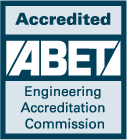
Alongside our longstanding Physics Program (science) established in 1895, we added an undergraduate Engineering Physics Program (engineering) in 2006. Our Engineering Physics Program is accredited by the Engineering Accreditation Commission of ABET, under the commission’s General Criteria with no applicable program criteria.
Engineering Physics Educational Objectives
Our Engineering Physics program educates students to become professionals with a blend of in-depth knowledge and skills in mathematics, science, and engineering, enabling them to understand physical systems, research technical questions and pursue opportunities to innovate, design solutions, and solve problems. Our program provides the foundation for graduate study and lifelong learning. Our objective is to prepare graduates who can successfully pursue:
- Professional careers at all levels in Engineering Physics or other professional pursuits where an engineering or physics background provides a valuable foundation. Examples of the latter are: focused engineering disciplines, medicine, law, and business administration.
- Advanced studies in Engineering, Physical Sciences, or related fields.
Enrollment and Graduates
65 undergraduate majors in Spring 2025 (not including first-year students). Our students declare a major in the Freshman or Sophomore year. 20 students earned a BSE degree in academic year 2024–25. 21 students earned a BSE degree in academic year 2023–24, and 15 in academic year 2022-23.
Engineering Physics Student Outcomes
We expect our graduates to demonstrate that they have attained the following skills:
- an ability to identify, formulate, and solve complex engineering problems by applying principles of engineering, science, and mathematics
- an ability to apply engineering design to produce solutions that meet specified needs with consideration of public health, safety, and welfare, as well as global, cultural, social, environmental, and economic factors
- an ability to communicate effectively with a range of audiences
- an ability to recognize ethical and professional responsibilities in engineering situations and make informed judgments, which must consider the impact of engineering solutions in global, economic, environmental, and societal contexts
- an ability to function effectively on a team whose members together provide leadership, create a collaborative and inclusive environment, establish goals, plan tasks, and meet objectives
- an ability to develop and conduct appropriate experimentation, analyze and interpret data, and use engineering judgment to draw conclusions
- an ability to acquire and apply new knowledge as needed, using appropriate learning strategies
